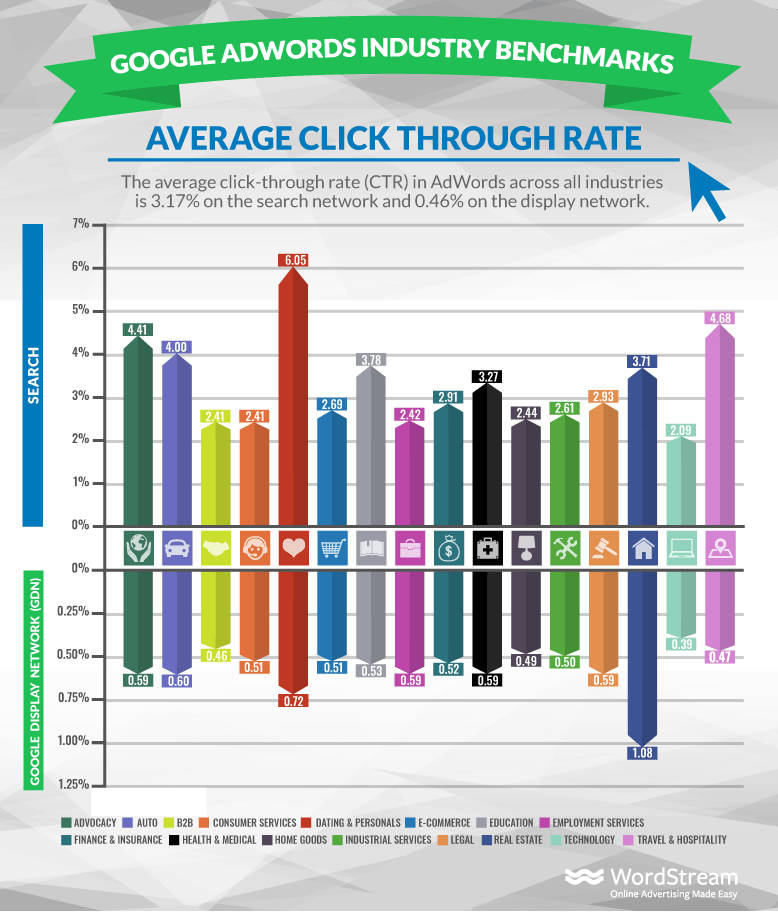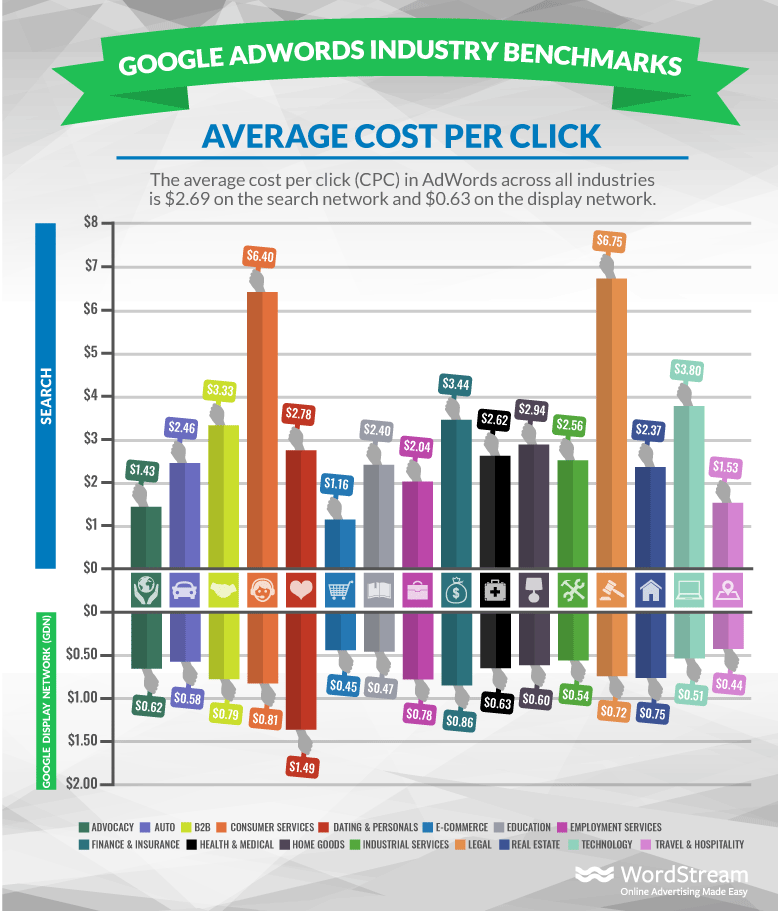Digital Advertising Business Growth
Pay-Per-Click Ads: How Does PPC Work and How You Can Use It
Whether you understand a little about pay-per-click advertising and want to learn more. Or know that you want to use PPC ads for your business, but are asking yourself “how does PPC work” and aren’t sure where to start… then you’ve come to the right place!
For many businesses, PPC marketing is an essential part of their marketing and advertising budget. Through investing in a strong PPC strategy, many aim for more leads, better traffic, improved conversions and boosted sales. And this is all very possible through the PPC advertising approach
For the first time in history, we’re looking down the barrel of digital ad spend eclipsing traditional media and advertising. Meaning that more and more businesses are opting to use paid digital media, more than traditional. Although traditional media such as television, radio and OOH still make money, this shift in spending over to PPC and other paid digital advertising methods is a true sign of the times.
However, before you can delve into the world of the modern business owner and kickstart your pay-per-click advertising, you first need to understand exactly what PPC is and how you can use it.
In this post, we’re going to cover just that. We’ll be going over everything you need to know about PPC to get started. So that once you’re finished reading, you’ll no longer be asking “how does PPC work”. Instead, wondering why you didn’t start your PPC journey earlier.
PPC stands for pay-per-click and is one of the main pillars of Search Engine Marketing (SEM). In short, PPC is a model of online marketing in which advertisers and businesses pay a small fee each time one of their ads are clicked. Essentially a way of buying visits to your site.
Search engine advertising is one of the most popular forms of PPC. It allows advertisers to bid for ad placement in a search engine’s sponsored links when someone searches on a keyword that is related to their business offering.
Difference between SEO and PPC
Often when people are looking into PPC, SEO questions tend to arise. Although the questions are always different, it’s always something like “SEO vs PPC”. Effectively asking what is SEO and does it affect my pay-per-click advertising?
When asking either “how does PPC work” or “how does SEO work”, it’s important to understand their key differences. Firstly, paid ads or pay-per-click ads for PPC, appear at the top of the page, above the organic listings (which are influenced by SEO). Secondly, SEO gathers free traffic through optimising content. Whereas PPC is paid for, per click, not per ad.
In short, SEO is only concerned with organic traffic, while PPC is paid-for conversions, such as clicks and traffic.
As for, “Does SEO affect PPC” or vice versa. Often SEO and PPC work best and complement each other when they’re more aligned. That doesn’t mean that one can’t influence another, because they can. However, this is not common.
Key tip: When designing your PPC ad, ensure that your tone, voice, look, feel and themes are on-brand. This is vital, but even more-so, if your ad contains visual elements. If your ad is visual, ensure that the ad is visually consistent and on-brand with the rest of your visual elements.
PPC Platforms
You’re probably very familiar with the current largest ad platforms. Each have their own unique benefits and best uses. The two biggest PPC platforms are Google and Facebook, and can often work together in your PPC strategy.
Google Ads, where pay-per-click ads are shown to customers based on their searches. Google Ads’ best value comes from showing your ad content to users who are actively looking for what you have to offer and are further along in the buying cycle.
Facebook Ads, which has an unparalleled “interests” targeting system, has two main strengths: retargeting based on segmented marketing and custom audiences and the ability to introduce your brand to customers who didn’t know they wanted it.
In short, Google Ads are about demand harvesting. While Facebook Ads are about demand generation.
There are also many other ad platforms out there, many of which exist on social media sites including:
- Twitter Ads
- Instagram Ads (part of the Facebook platform)
- Promoted Pins
- LinkedIn Ads
- Quora Ads
- YouTube Ads
Many businesses like to stagger their ad spend between different ad platforms to get the most benefits possible from each. Almost all ad platforms utilise a bidding system & have the following elements:
- Account
- – Goals
- – Structure
- Campaigns
- Targeting
- – Keywords
- – Demographics
- – Interests
- – Behaviours
- – Devices
- – Locations
- – Scheduling
- – Budget
- – Delivery
- Ads
- Conversion Tracking
- Remarketing
READ: Remarketing: The Facebook Ads Setup Proven to Boost Your Leads & Sales
How much does a PPC campaign cost
Pay-per-click advertising prices are dynamic and therefore can regularly change. Still, because the business owner or advertiser is always in full control of their ad spend, they can choose to pay as much or as little as they desire.
The ad platforms allow for simple management of PPC ads. Meaning you can modify your ad spend, pause or stop a campaign, at any time. Regardless if you’re posting on search engines, websites, blogs or social media platforms.
The overall cost of your PPC campaign can be controlled easily with a daily budget. So you can set this budget within your pay-per-click ads manager on your platform of choice. And once your budget is met for the day, your ad disappears from Google.
You can decide your daily budget and length of the campaign when setting up your campaign. Meaning you can set a manageable and realistic cost for that campaign before any ad has been displayed.

How much should you spend on a PPC campaign
The most important consideration for budget planning is your lead needs. If you’re not sure what your target lead looks like, start by answering the following questions:
- What can I afford to spend?
- What is my current conversion rate?
- How many leads do I need through PPC?
- What the industries average CTR & CPC?
Let’s take a closer look at the information you’ll need to make smart decisions about your PPC budget. Once your marketing team knows the answers to these questions, you can do some basic calculations to help you figure out a budget.
You can see your industry average CTR and CPC in the infographic below from WordStream, Using this information you should be able to work out how much ad spend would be required to reach your sales goal.


Here’s an example of how the math might work:
- If you need 100 new sales in a month and your close rate is 18% then you need 556 leads.
- If your website converts at industry-standard 1-2% you will need 27,778 online visitors.
- However, if you build a sales/landing page which converts at between 5-10% you need much less – 7,407 online visitors.
- Your Ad Click-Through Rate and Cost Per Click (how effective and relevant your ads are) will affect your spend.
Key tip: Knowing your audience is key in delivering effective PPC campaigns. If you deliver content to your audience that they’re not interested in, your campaign will fail. So if you know your audience you’ll more likely deliver the right content to them, as 51% of brands don’t do.
How effective is PPC
The effectiveness of a PPC campaign that your running comes down to a few things. How you’re running your PPC campaign, your planning and research, and how robust your overall PPC strategy is.
The effectiveness of pay-per-click ads come down to the effectiveness of the ad itself. Meaning the keywords used, the ad copy, landing page and PPC manager and setup are all vital. These five components of a pay per click account all work together to help you achieve the best results.
All the while, all your results are measurable within your analytics tools. What you can see how many visits originated from Pay Per Click, how long they spent on site and pages viewed. Taking all of these into consideration compared to how much you’ve spent, is the best way to establish whether or not your PPC campaign is valuable.
READ: Avoid Making 3 Ad Copy Mistakes and Boost You Paid Search Success
Your PPC Funnel
A lot goes into building a winning pay-per-click ads funnel. From researching and selecting the right targeting, to setting up landing pages that are optimized for conversions.
If your ads and landing pages are helpful to users, the ad platform will charge you less per click, leading to higher ROI. So if you want to start using PPC, it’s important to learn how to do it right.
Which ad platform you use and how much of your advertising spend you allocate will depend on a couple of things. Your online setup, sales funnel, where your target audience is & the goal you want to achieve.
If you’re going to pay for online traffic, your online setup should include a well-designed landing page for higher conversion rates.
Your online campaigns should feed into your sales funnel intuitively, there’s no point having customers call your business if you have an e-commerce store with no-one manning the phones.
If your target audience doesn’t know you exist yet – there should be no expectation that they’re going to Google you, so choose the right platform.
If the goal is for customers to come into a showroom rather than download a brochure, the language you use in your ads, on the landing page and call-to-action will be vastly different.
Each of these factors will help determine which ad platform is best for you, how much it will cost and how successful it will be overall. Next, all you need to do is implement and manage your PPC campaign, measuring its success.
Take Action
Pay-per-click advertising can be intimidating at first, but online marketing and advertising is an incredible way to attract traffic, leads and sales. Ad platforms can put you in front of audiences who are actively trying to find products and services just like yours, as well as audiences who had no idea that products like yours existed.
No matter how overwhelmed you feel, know that we at Caffeinate are constantly testing and trying new things. So if you’re willing to test out different ideas, you’ll eventually figure out what works for you and what doesn’t.
Want to skip the hard parts? You can always engage a digital marketing agency to make sure that you start on the right foot. Get in touch with us here at Caffeinate Digital to learn more about how we can help you with your online leads & sales.
We want to hear from you! Follow us on LinkedIn, Facebook and Instagram to keep up with us, get our notifications and start a conversation!


 Level 28, AMP Tower, 140 St Georges Terrace, Perth WA, 6000
Level 28, AMP Tower, 140 St Georges Terrace, Perth WA, 6000  +61 8 6244 0022
+61 8 6244 0022 

